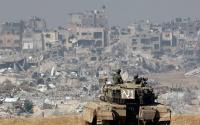Marwan Bishara 14 July 2004
The view from inside
JERUSALEMWhen the International Court of Justice in The Hague announced its ruling against Israel in the case of the "security fence," I was in the company of 23 Palestinians and Israelis who had mounted a hunger strike in Jerusalem to protest the Israeli wall. The moral clarity and legal strength embodied in the court's advisory opinion gave us, and the rest of the world, an abundance of food for thought.The decision marks a triumph for justice and a victory for the Palestinian people, whose decades of suffering has multiplied with the erection of the 900-kilometer barrier.Not only is Israel walling in over a million Palestinians in separate cantons, it is also walling out 200,000 Palestinians living in 132 villages which will be sandwiched between the wall and the Green Line that separates Israel from the West Bank. The wall functions as a demographic fence - it incorporates the greatest number of Jewish settlers in Israel, while separating Israel from a maximum number of Palestinians and leaving the rest in a no-man's land.For more than two years now, Israel's segregationist policies - in the form of laws, barriers, barbed-wire fences, walls and over 130 military roadblocks - have separated families, destroyed livelihoods and impeded access to education and health services. Israel's responsibility for the human rights and living conditions in occupied territory was recognized by Israel's own high court when it ruled that the government must change the wall's path in two disputed areas.This made the international court's ruling more pertinent and gave the Palestinians renewed hope. The court demanded that Israel cease its breaches of international law, dismantle the wall in its entirety and compensate the residents for all damages.The Palestinians' sigh of relief turned quickly into a stare of disbelief as they watched American officials dismiss the landmark decision, following Israel's outright rejection of it.The Bush administration is promising to veto any resolution by the UN Security Council based on the court's opinion. In other words, what the dissenting American judge couldn't do on the international court, where the other 14 members voted in support of the ruling, the United States intends to do in the United Nations.Such an irresponsible step would alienate what's left of America's friends and allies and render the United States morally responsible for future escalation of bloodshed in Palestine. Washington would also harm Israel's long-term interest by helping Ariel Sharon transform occupation into irreversible apartheid.The Sharon government has utilized the "separation security fence" as camouflage to maintain two separate systems in the West Bank: a superior and prosperous one for the Jewish settlers who have total freedom of movement, and an inferior and impoverished one for the Palestinians within the wall.Israeli officials apparently reckon that the borders of a future Palestinian entity will be drawn within the separation walls. The Palestinians would then end up with half a state on half of the West Bank and in the Gaza Strip.The wall around Gaza has demonstrated that a "security fence" can fence in the Palestinians without bringing security or stability to Israel. The bloodiest confrontations, with the highest casualties and the heaviest Israeli bombardments, have taken place in the Gaza Strip. Those claiming that the West Bank wall has already helped prevent attacks against Israel have only themselves to blame when a strangled West Bank overheats like Gaza.For all these reasons, the Security Council must take a stand. Will it send the Palestinians a signal that international legality, not suicide bombings or terrorism, is the weak man's weapon against injustice? Or will it signal to Israel that it can continue to violate the Palestinians' basic rights under the guise of the war on terrorism?The United States should at the least try to convince Israel to erect its wall on the Green Line. Otherwise, the United States will join Israel as a state in breach and contempt of international law.Marwan Bishara, a visiting professor of international relations at the American University of Paris, is the author of "Palestine/Israel: Peace or Apartheid?"





